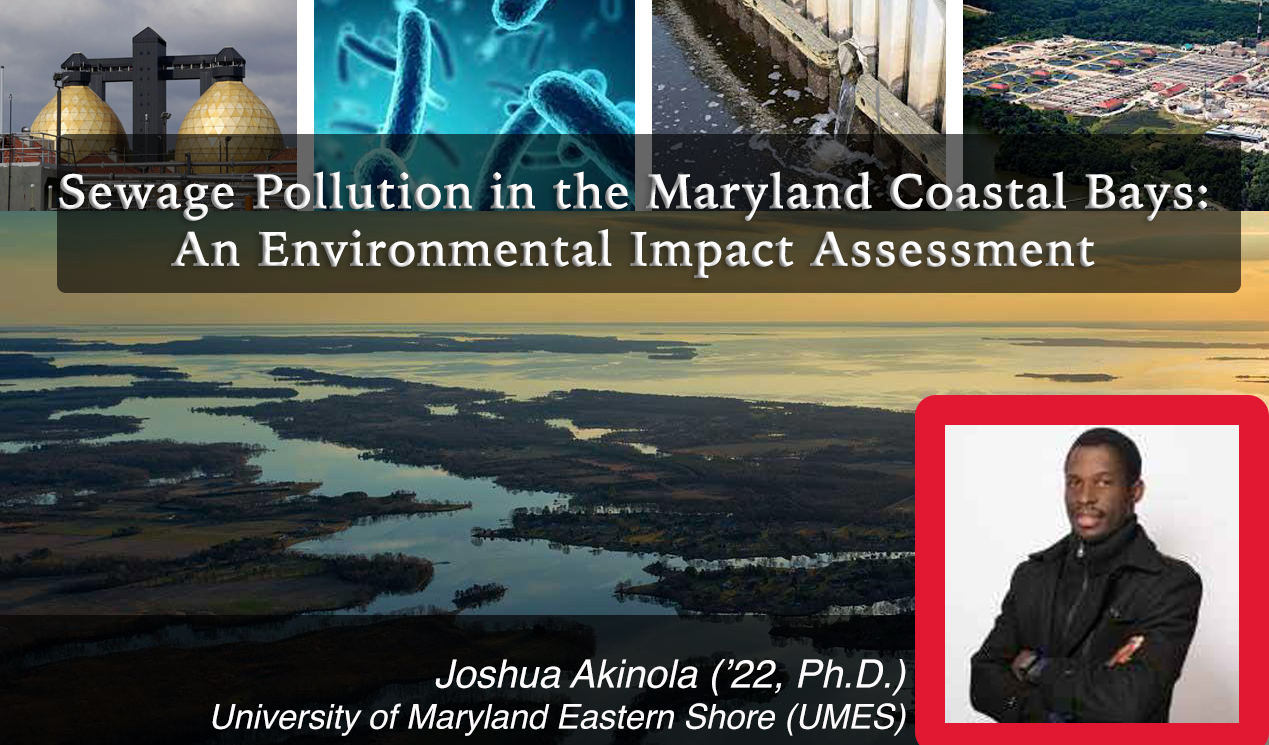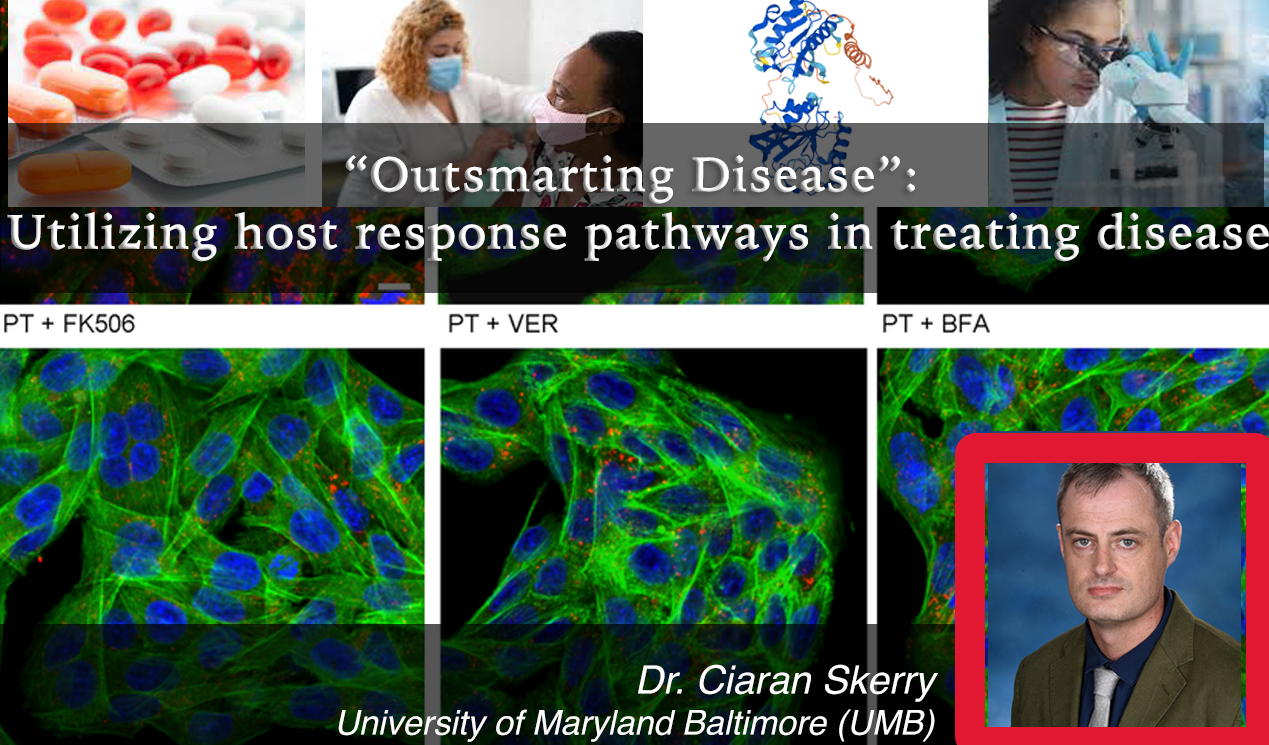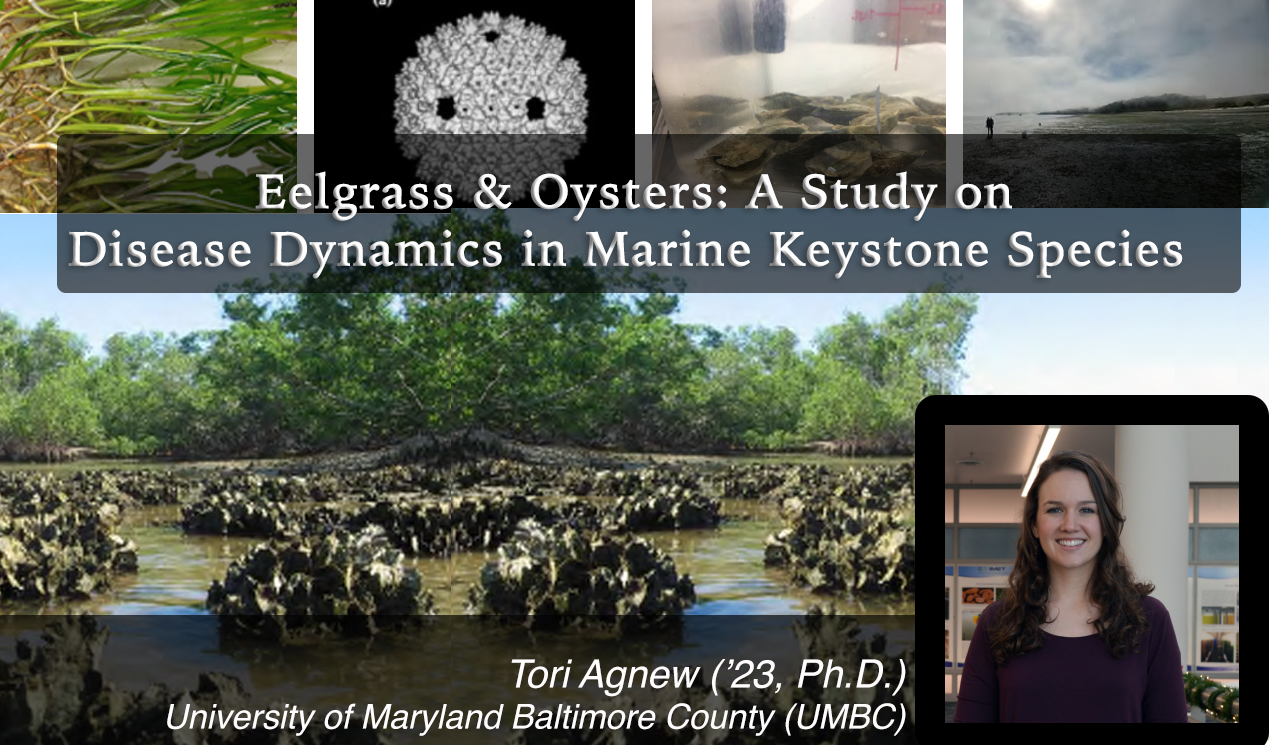MEES IN THE NEWS
january 2024 - Foundation spotlight: ENVIRONMENTAL MOLECULAR SCIENCE & TECHNOLOGY
NEWS ARCHIVE
ALUMNI CORNER
MEES RESEARCH CENTER
Joshua Akinola. Photo Courtesy: Self
Joshua Akinola (‘22, EMST) is a second year doctoral MEES student at the University of Maryland Eastern Shore. Advised by Dr. Paulinus Chigbu, Joshua’s research cuts across coastal marine toxicity and ecology, oil pollution, environmental impact assessment, and bioelectrochemistry.
Tori Agnew. Photo Courtesy: UMBC/IMET
Mary Victoria (Tori) Agnew (‘23, EMST) graduated with her Ph.D. in MEES this past Fall 2023 from the University of Maryland, Baltimore County. Advised by Dr. Harold Schreier, Tori’s research focused on understanding threats to keystone species in an era of global climate change, focusing on marine environments which are particularly vulnerable.
eelgrass & OYSTERS: A STUDY on disease dynamics in marine keystone species
TORI AGNEW (‘23, Ph.D)
Tori Agnew (23, Ph.D) Photo Courtesy: UMBC/IMET
Mary Victoria (Tori) Agnew (‘18, EMST) graduated with her Ph.D. in MEES this past Fall 2023 from the University of Maryland, Baltimore County. Advised by Dr. Harold Schreier, Tori’s research focused on understanding threats to keystone species in an era of global climate change, focusing on marine environments which are particularly vulnerable. Specifically, investigating whether oysters can help seagrass fight disease. Prior to joining the MEES program, Tori graduated summa cum laude (cum 3.93) from Roger Williams University with her Bachelor’s of Science in Marine Biology and a double minor in Chemistry and Spanish. While at RWU, Tori worked under Dr. Roxanna Smolowitz, Associate Professor and Director of the Aquatic Diagnostic Lab at RWU, assisting in identifying parasitic abundance in blue mussel tissue, and collecting and processing samples of qPCR diagnostic work on oysters. The results from the blue mussel work developed into Tori’s senior thesis which expanded to include qPCR methods to detect cercaria [an infectious parasite] in the water column and the results were presented as a poster at the World Aquaculture Society in February 2016, and the National Shellfisheries Association in March 2017. Tori also garnered numerous awards and fellowships including the Mark Gould Memorial Research Fellowship and Grant (2015), the Dean’s List (2013-2017), the Roger Williams University Outstanding Senior in Marine Biology Award (2017) and the Center for Economic and Environmental Development (CEED) Student Research Grant (2015). Since joining the MEES program, Tori has greatly contributed to the program, serving as President of the MEES-GSO, the MEES Graduate Student Organization, who hosts events like the alumni panels, managing the MEES GSO social media platforms as well as assisting with critical components of the annual MEES Colloquium, and served as a member of the MEES Program Committee. Based at the Institute of Marine and Environmental Technology (IMET), Tori’s dissertation research focused on two disease systems: the virus Ostreid Herpesvirus-1 (OsHV-1), which affects Pacific oysters Crassostrea gigas (Cg), and the protist Labyrinthula zosterae (Lz), which causes seagrass wasting disease (SWD) in Zostera marina, or the common eelgrass. Eelgrass helps stabilize sediments and reduce erosion, and is a tool for improving water quality while providing a stable habitat for many aquatic and coastal species. Although these are separate disease systems, the two host species often overlap in the intertidal zone and both have a substantial effect on the ecosystems they inhabit. SWD has been associated with massive losses of eelgrass globally, and OsHV-1 causes mass mortality events in Pacific oysters globally, which has devastating impacts on oyster farms and the ecosystem services oysters provide. Tori’s dissertation aimed to address fundamental questions regarding the host-pathogen interactions for both diseases which are currently unknown or understudied. The results provided key aspects of disease in these two foundation species, and highlighted the potential for the two species to benefit from co-culture with each other. Tori hopes these findings help improve future laboratory and field studies as well as the monitoring of disease over time. Her dissertation is entitled, “Disease Dynamics in Marine Keystone Ppecies: Understanding Pacific Oyster-Ostreid herpesvirus-1 and eelgrass-Labrinthula spp. interactions”. For more information on Tori, please click here.
Dr. Ciaran Skerry Photo Courtesy: UMB
‘outsmarting disease’: utilizing host response pathways in treating disease
Dr. Ciaran Skerry is Assistant Professor of Microbiology and Immunology at the University of Maryland Baltimore medical school. Dr. Skerry, who has a pending MEES Graduate Program Faculty membership under the Environmental Molecular Science and Technology Foundation, has conducted research focused on translating basic science discoveries in bacterial pathogenesis into host-directed therapeutics. Host-directed therapeutics, also called host targeted therapeutics, act via a host response to disease (pathogens) rather than acting directly on the disease (pathogens) like traditional antibiotics. Dr. Skerry earned his Bachelor’s of Science in Biotechnology at the National University of Ireland, Maynooth with first class honors in 2006. Dr. Skerry continued his studies at Maynooth, by pursuing his doctoral degree under the advisement of Dr. Bernard McMahon. For his doctoral dissertation, Dr. Skerry found a live B. pertussis, commonly known as whooping cough, vaccine strain that effectively infects mice with the bacteria but also elicits an immune response without the mice exhibiting any of the symptoms. As a doctoral student, Dr. Skerry was also the recipient of the highly selective and distinguished John and Pat Hume Research Scholarship (2006-2010), a four year fully funded award given annually to only eight outstanding doctoral students at the National University of Ireland, and the prestigious Irish Research Council for Science Engineering and Technology Scholarship (now the Government of Ireland Postgraduate Scholarship). After earning his Ph.D. in Immunology in 2010, Dr. Skerry further developed his microbiology training at Johns Hopkins University Center of TB research, where Dr. Skerry followed key discoveries on the effects of low levels of oxygen in the blood (or hypoxia) in chronic inflammatory indicators in mice; examining the potential of immunomodulators, substances that help the body’s immune system fight disease, to improve the efficiency of antibiotics and the reduction of inflammation. That research discovered that a particular combination of cholesterol lowering medication, or “statins”, and anti-inflammatory drugs on TB infected mice led to an increase in the bacteria fighting efficiency (bactericidal) of first-line drugs. Dr. Skerry is a member of the Irish Society of Immunology, the British Society of Immunology, and the American Society for Microbiology. Dr. Skerry continued his work on understanding host-pathogen interactions in B pertussis at the University of Maryland Baltimore where his current work is exploring the possibility of the peptidoglycan recognition protein 4 (PGLYRP4), an antibacterial and anti-inflammatory immunity protein found in humans, in the treatment and development of B pertussis disease treatment and attenuation. Dr Skerry hopes this work will further understanding of the pertussis pathogenesis and biology, as well as increase understanding of anti-inflammatory drug use in the treatment of B pertussis. Dr. Skerry plans to actively recruit MEES graduate students, and instruct future MEES courses. For more information on Dr. Skerry, please click here.
Back to Top
MEES RESEARCH CENTER
sewage pollution in the maryland coastal bays: an environmental impact assessment
Joshua Akinola Photo Courtesy: UMES
Joshua Akinola (‘22, EMST) is a second year doctoral MEES student at the University of Maryland Eastern Shore. Advised by Dr. Paulinus Chigbu, Joshua’s research cuts across coastal marine toxicity and ecology, oil pollution, environmental impact assessment, and bioelectrochemistry. Prior to joining the MEES program, Joshua earned his Bachelor’s of Agricultural Technology from the Federal University of Technology, Akure, Nigeria, in 2014, where under Dr. Olamide Olawusi-Peters, Acting Head of the Department of Fisheries and Aquaculture Technology, Joshua’s undergraduate thesis was based on the assessment of ecological and human health hazards in the consumption of seafood contaminated with total petroleum hydrocarbons in the coastal areas of Nigeria. Just four short years later, Joshua earned a Master’s in Fisheries Management in 2018 also acquiring extensive research & teaching experience. Joshua currently has 6 peer reviewed published articles, is a Mundu Maris Honorary Diploma Awardee (2019). Since joining the MEES Graduate Program, Joshua has earned numerous awards including the prestigious 2023 Debbie Morrin Nordlund travel award which allowed him to make a poster presentation at the 153rd Annual Meeting of the American Fisheries Society at Grand Rapids, Michigan from August 20 - 24, 2023, entitled “Distribution, Sources, and Risk Characterization of TPH in Tropical Coastal Waters and Seafood”. Joshua’s current dissertation research is focused on sewage pollution in the Maryland Coastal Bays (MCB)’s using several chemical markers: sterols and nitrogen stable isotope ratios, FIB’s, and pathogenic microorganisms. Joshua’s poster presentation is entitled, ”Determination of Sewage Pollution in the Maryland Coastal Bays Using Chemical Markers (Sterols and Nitrogen Stable Isotope Ratios), Fecal Indicator Bacteria (FIB), and Pathogenic Micro-organisms”. For more on Joshua, please click here.






